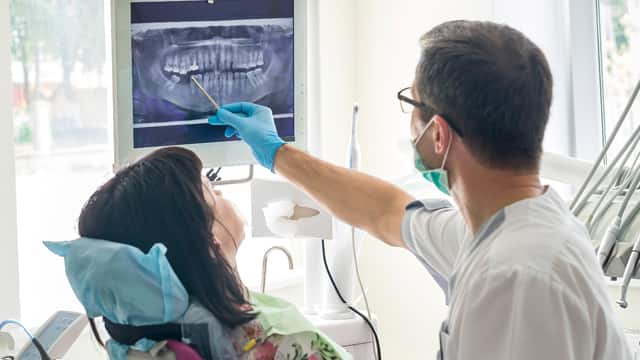Why are Mouthguards Important?
Why wear a mouthguard? In the same way, helmets protect against head trauma, mouthguards are the go-to to prevent injuries to the face and mouth.
Made of soft plastic or laminate, mouthguards prevent injuries incurred when you receive contact to the face or mouth. In addition to your teeth, they also protect your mouth, gums, cheeks, and jaw.
Why do athletes wear mouthguards? Athletes of all ages, genders, and skill levels are at risk of sustaining a dental injury. While it can be scary to think about, mouthguards are great at doing their job. One study from Dental Traumatology found that mouthguards helped lower the prevalence of dental trauma among athletes of contact sports.
Many people who could benefit from the protection offered by a guard choose not to use them. While damage to the mouth and face is common in many sports, only 41% of players reported using a mouthguard.
Now, if your child asks, "why do I need a mouthguard?" you'll be ready with answers.
How Mouthguards Protect
Mouthguards can't prevent an accidental elbow from hitting you in the face during an intense game. However, they can lessen the resulting damage or avoid it altogether. They accomplish this by spreading the impact out, reducing it across each area like an individual tooth. Also, their construction of soft material ensures they absorb some of the force.
Using Mouthguards in Sports
According to a paper in Sports Medicine, sports injuries contribute to one-third of all injuries to the mouth and face. The good news is they also found that wearing a mouthguard is effective at reducing these injuries.
Mouthguards win out as one of the least expensive and most beneficial pieces of protective equipment available. You can buy the cheapest guards for under $20, potentially preventing severe dental injury costing thousands of dollars.
While only a few sports tend to require their use, we recommend considering a mouthguard for any activity with the chance of incidental impact to the face. Basketball is a great example. Even though they often aren't mandatory, many players won't go on the court without one because they know a misplaced elbow could mean serious injury.
Sports that require or recommend mouthguards:
- Contact sports like boxing, martial arts, football, rugby, lacrosse, and hockey
- Team with the chance of incidental contact including basketball, field hockey, soccer, wrestling, softball, and volleyball
- Action sports like mountain biking, skateboarding, skiing, and snowboarding
If your favorite sport isn't on our list, it's likely the safe option to use a mouthguard to avoid potential injury and an expensive dental bill.
Types of Mouthguards
Even though a few different kinds of mouthguard are available, their general function is the same: they protect your face and mouth from damage. A good rule to keep in mind? The better the fit of your mouthguard, the better the protection you'll get by wearing one.
There are three general varieties of mouthguards:
- Stock comes in a range of premade shapes and sizes. They're the cheapest option but don't offer a comfortable fit or high protection level because of their one-shape-fits-all build.
- Boil-and-bite is a good middle-ground between premade and custom-made in terms of cost and function. These are named after the process to mold them, which is to place them in boiling water before biting into them to leave an impression of your teeth.
- Custom-made offer the best protection and is often worth the higher cost. A dentist takes an impression of your teeth and gums then orders a guard personalized to your bite.
Molded mouthguards like the boil-and-bite and custom-made varieties will provide the most comfortable and secure fit. The American Dental Association recommends proper-fitting mouthguards in any sport that could lead to injury.
Regardless of type, a good mouthguard should be comfortable and not restrict breathing. Ideally, they should be easy to clean and durable so they can sustain reuse without sacrificing protection.
Taking Care of Your Mouthguard
When caring for your equipment, keep in mind that they perform best with a good fit. Anything that would warp or damage your mouthguard is best to avoid.
Easy tips to keep your mouthguard in top shape:
- Rinse it with cold water and clean with toothpaste and a toothbrush before each use to remove bacterial plaque and debris
- Soak it in non-alcoholic mouth rinse before cleaning with water
- Store it in a rigid container to keep it safe from damage during travel or storage
- Avoid hot water, hot surfaces, and direct sunlight that could lead to warping.
- Check regularly for damage.
If the mouthguard is damaged, warped, or no longer provides a good fit, we recommend buying a new one. Rest easy knowing it's worth the cost for protection and peace of mind.
If you're not already using one, we recommend adding a mouthguard to your collection of safety equipment. They provide an incredible amount of protection (and peace of mind!) at a low cost. You can't prevent every sports injury, but mouthguards give you a fighting chance.
Oral Care Center articles are reviewed by an oral health medical professional. This information is for educational purposes only. This content is not intended to be a substitute for professional medical advice, diagnosis or treatment. Always seek the advice of your dentist, physician or other qualified healthcare provider.
ORAL HEALTH QUIZ
What's behind your smile?
Take our Oral Health assessment to get the most from your oral care routine
ORAL HEALTH QUIZ
What's behind your smile?
Take our Oral Health assessment to get the most from your oral care routine






.png)








